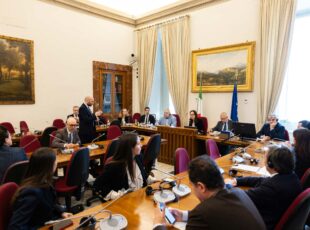Brussels Votes on Tough New Resolution On Russia
The following piece is translated from the original published in Nezavisimaya Gazeta.
Today, the European Parliament will vote on a draft of a new tough resolution on Russia. The draft document obtained by NG suggests that signing of any new agreements with Russia be suspended in case of serious violations of human rights. MEPs have called recent laws by the State Duma on NGOs, rallies, propaganda on homosexualism and control over the Internet unacceptable. British Deputy Prime Minister Nick Clegg supported the resolution.
The passing of the document has been timed to President Vladimir Putin’s attendance of the Russia-EU summit in late December. There is no doubt in Europe that the resolution will be approved. Its main idea is that respect for human rights should be “an absolute prerequisite” for signing any agreements with Russia.
As MEP Kristina Ojuland explained to NG, this resolution should become feature in discussions of any agreements between Russian and the EU; for instance the one on easing the visa restrictions.
NG’s source in the European Parliament links the adoption of the resolution to the signing of the EU-Russia partnership agreement that is extended every year: “We insist that the agreement should be based on the principle of mandatory respect for human rights, and the Council of Ministers and the European Commission should be guided by that. Otherwise, the European Parliament may refuse to ratify the new agreement with Russia.”
The author of the resolution is Hannes Swoboda, the S&D leader at the European Parliament. The agenda of the document reflects almost all of the recent grievances the Russian civil society has toward the authorities. Europe promises to keep a close eye on every case of human rights violations in our country.
The document calls the laws recently passed by the State Duma restricting freedom of assembly and work of non-profit organisations as well as regulation of the Internet unacceptable. MEPs said these new laws contain controversial measures and entail risk regarding their arbitrary interpretation by bureaucrats.
The draft resolution demands an “end to impunity” from the Russian authorities in the country that manifests itself in “politically motivated persecutions [and] arrests” and use of repressive measures against the opposition.
MEPs also criticised the bill concerning propaganda of homosexualism finding that it contradicted not only international treaties but even the Russian Constitution. The Russian authorities are asked not to hide behind “‘traditional values’ to legitimise discrimination against minority groups, silence dissent, or violate people’s human rights.”
Also the Russian authorities are required to guarantee that the deaths of journalist Anna Politkovskaya, human rights activist Natalya Estemirova, former FSB agent Alexander Litvinenko and Hermitage Fund lawyer Sergei Magnitsky “be investigated in an impartial and independent fashion” and urged to conduct a new investigation into the Yukos case.
The draft resolution calls on the Russian authorities to change the political climate in the country so that “civil society and NGOs can operate without … fear of harassment or intimidation”. The document emphasises that given Russia’s WTO accession, economic modernisation is not enough, and full political reform is also required.
The plan is to incorporate in a new agreement with Russia, signing of which is planned at the upcoming EU-Russia Summit, “a clear mechanism of suspension [of the cooperation with the Council of Europe and OSCE] in case of serious [human rights] violations”.
As Guy Verhofstadt, leader of the Liberals and Democrats in the European Parliament, told NG, the main aim of the resolution is to question and possibly even suspend signing of agreements with Russia if the country continues to violate human rights and its obligations in the framework of the Council of Europe.
Lilia Shevtsova, an expert of the Moscow Carnegie Centre, concluded that Europe’s attitude toward Russia’s current regime becomes colder and colder, and the tone of the resolutions becomes tougher and tougher. According to her, the Russian authorities are now condemned not only by liberal factions of the European Parliament but by their more conservative colleagues as well.
The main thing, Shevtsova adds, is how the EP manages to influence the Russia policy of EU’s key states, France and Germany: “Paris so far has a more pragmatic attitude; they say they are more concerned with business than with human rights in our country. At the same time, the attitude of German elites has changed – they are actively criticising Putin’s regime.” In 2013, Europe will try a new tactic in dealing with Russian officials: “We will treat you and your accounts the same way you treat your compatriots.”



